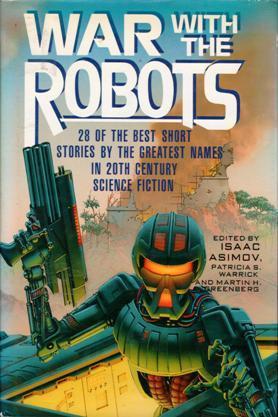What do you think?
Rate this book


ISFD says, " (variant of Machines That Think: The Best Science Fiction Stories About Robots and Computers 1984)"
Contents
1 • Introduction: Robots, Computers, and Fear • (1984) • essay by Isaac Asimov
15 • Moxon's Master • (1899) • short story by Ambrose Bierce
29 • The Lost Machine • (1932) • novelette by John Wyndham
50 • Rex • (1934) • short story by Harl Vincent
68 • Robbie • (1940) • short story by Isaac Asimov (variant of Strange Playfellow)
93 • Farewell to the Master • (1940) • novelette by Harry Bates
139 • Robot's Return • (1938) • short story by Robert Moore Williams (variant of Robots Return)
153 • Though Dreamers Die • (1944) • novelette by Lester del Rey
175 • Fulfillment • (1951) • novelette by A. E. van Vogt
209 • Runaround • [Mike Donovan] • (1942) • novelette by Isaac Asimov
233 • The Evitable Conflict • [Susan Calvin] • (1950) • novelette by Isaac Asimov
261 • A Logic Named Joe • (1946) • short story by Murray Leinster
279 • Sam Hall • [Sam Hall Universe] • (1953) • novelette by Poul Anderson
314 • I Made You • (1954) • short story by Walter M. Miller, Jr. [as by Walter M. Miller]
327 • Triggerman • (1958) • short story by J. F. Bone
339 • War with the Robots • (1962) • short story by Harry Harrison
362 • Evidence • [Susan Calvin] • (1946) • novelette by Isaac Asimov
387 • 2066: Election Day • (1956) • short story by Michael Shaara
404 • If There Were No Benny Cemoli • (1963) • novelette by Philip K. Dick
430 • The Monkey Wrench • (1951) • short story by Gordon R. Dickson
443 • Dial F for Frankenstein • (1965) • short story by Arthur C. Clarke (variant of Dial "F" for Frankenstein)
452 • The Macauley Circuit • (1956) • short story by Robert Silverberg
463 • Judas • (1967) • short story byJohnBrunner
473 • Answer • (1954) • short story by Fredric Brown
477 • The Electric Ant • (1969) • short story by Philip K. Dick
501 • The Bicentennial Man • (1976) • novelette by Isaac Asimov
547 • Long Shot • (1972) • short story by Vernor Vinge
563 • Alien Stones • (1972) • novelette by Gene Wolfe
598 • Starcrossed • (1973) • short story by George Zebrowski
607 • Bibliographies of Additional Reading • essay by uncredited
609 pages, Hardcover
First published January 1, 1983